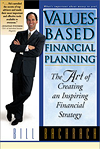What’s important about money to you? While this question won’t help you identify your client’s investment objectives or risk tolerance, it will give you insight into your client’s core values and build a high trust relationship. As we lead our clients through an uncharted investment environment that stress tested Modern Portfolio Theory, the client’s trust in their advisor is the single most important element in our client relationship. How do we grow trust?
Bill Bachrach outlines, with a unique twist, the consultative approach versus the sales approach to financial planning. As an advisor himself in the ‘80’s, Bill’s grew frustrated with the transactional approach he was taught. Traditional sales training centers on fear or greed as motivators for clients. While these tactics work, they do not build trust.
“Fortunately, I was inspired to break away from the industry norm and developed a philosophy and methodology to help clients make smart choices about their money and their life so they achieve their goals in a way that fulfills their values, regardless of the current economic cycle. It’s called Values-Based Financial Planning™. The by-product is a high-trust client relationship. It’s a long-term relationship of mutual respect and honor predicated on a genuine desire to help and a process that creates a predictable result.
Clients are happier and more loyal. The Financial Professional enjoys a more prosperous business that is much more emotionally gratifying.”
Bachrach created a Financial Road Map for Living Life on Purpose which is designed for the advisor to lead the clients through the process of identifying their values, reviewing their current financial situation and identifying their goals. The first step is for the advisor to facilitate each spouse separately completing a “values staircase,” which begins with the question, “What’s important about money to you?” The esoteric, philosophical answers going up each step range from security, freedom, satisfaction and fulfillment, to a meaningful life. When the clients begin this sometimes emotional process of identifying their values, it puts them in a better frame of mind to consider their big picture, the long term. When the advisor leads them through this emotional process, sometimes for the first time, it creates a bond of trust between the advisor and the clients. The advisor now knows what truly matters to the couple. The advisor now knows if the couple is in alignment themselves.
This first stage in the process inevitably reveals the type of client you will potentially be dealing with. Is the prospect a “Do-it- Yourselfer” who values money over time or has difficulty trusting anyone to do the job as well as he can? Is the prospect a “Delegater” who values time over money and wants to follow the advice of the objective advisor? (Obviously the ideal client) Or is prospect a “Collaborator” who falls in between the “delegater” and the “do-it-yourselfer” who typically collects information and uses several advisors.
The values-clarification staircase provides insight to the advisor to determine if she wants to establish a relationship with the couple, gives long term direction to the prospects, and builds a powerful level of trust between the advisor and the prospect. All this accomplished in the initial stage of the first meeting, in the first several minutes. Setting the stage for the values conversation and helping the prospect move up the stairs in a conversational, non interrogative manner takes some practice. The book lends helpful insight to this stage. The advisor needs to listen more than talk during the values conversation and realize it is more important for the advisor to understand the prospect then the prospect to understand the advisor. Set the stage providing a brief, logical explanation with confidence of why you are asking, and then ask “What’s important about money to you?” with genuine interest, then listen to the answer. Proceed at your prospect’s pace.
With trust established, you can easily transition to the discovery phase of the interview. This will naturally lead to seeking and obtaining the prospects’ commitment to take charge of their financial future. The values conversation dovetails with any fact finder or asset-profile system. Managed properly, it positions you for a direct, open, honest and thorough discovery experience. At this point you discover all the assets, prioritize the goals and plot them on the Financial Road Map. This compelling visual picture of the client’s lives makes it extremely clear where they are now, where they want to be, and what’s important about working to get there.
You have earned your client’s trust and now you need to maintain this trust by adding value. You are more than a financial professional; you contribute to the total quality of life of your clients by helping them achieve their goals and fulfill their core values.
Add value to your relationship with your clients by implementing these suggestions:
- Give the new client a welcome gift- perhaps a crystal clock or a book. Bachrach ‘s Value Based Financial Planning book, geared towards investors, is available on their website. www.bachrachvbfp.com
- Systematically mail to new and existing clients one value-added piece each month. Each piece contains an idea that can contribute to some aspect of their client’s health: mental, physical, relationship, spiritual or financial.
- Make sure you hold a statement review meeting to coincide with the first statement the client receives. This meeting confirms what you told the clients in the first interview and allows you to help them understand the statement, update them about your progress with their referrals, answer their questions, acknowledge w hat they have done well, discuss and obtain commitment for what they need to do better and elicit more referrals.
Clients who trust the Value Based Financial Planner and are impressed with the work will gladly provide referrals. Here are eight guidelines that help you obtain referrals and turn the referred prospects into lifetime clients:
Bachrach’s advice to mastering Values Based Financial Planning breaks with much of what comes instinctually to us and is sometimes painfully true:
Selling is not about closing; it is about opening; opening a high-trust relationship with people who want you to help them with their financial life more than you want to sell financial products.
Bachrach advises audio taping every interview, listen to the recording, evaluate the strengths and weaknesses and improve. If you give seminar or group presentations, videotape those sessions, watch them, evaluate their effectiveness and improve. Ask someone you respect to listen to your audiotapes or videotapes and give you feedback.
The website is a wealth of information, white papers, webinars, audios, coaching programs, books and skill mastery sets. The Success Roadmap is a chart similar to the Financial Road Map but designed to help the advisor build his practice and Bachrach’s The Roadmap to Success book leads you through this chart as well. www.bachrachvbfp.com
- Ask for referrals in a way that shows clients how they stand to benefit from giving you referrals.
- Make it simple for your clients to provide referrals by showing them your Ideal Client Profile.
- Write down the names as your clients provide them.
- Research: Find out as much as you can from your client about the referred prospect.
- Build credibility with the referred prospect by sending a good letter of introduction from the client to the referral.
- Send seven or eight value-added mailing pieces to the referral before you make contact.
- Decide exactly what you will say before you call. Anticipate common concerns.
-
Don’t sell on the phone; just try to determine if there is a reason to meet and if there is a potential for a good business relationship.
- Eliminate all small talk and chitchat and open the interview with the meaningful and emotional values conversation. (Some prospects might even cry) Meaningful human connection and conversation are what builds trust.
- Politely but firmly end the interview with people who do not cooperate in the first five minutes. It’s OK not to sell everyone.
- Never talk about yourself, your credentials or your company. Let people draw their conclusions about your competence and credibility by how you behave instead of by what you say. Have a simple brochure they can read at their leisure. Give it to them only if they ask.
- Insist prospects bring all their financial documents to their first meeting and expect them to cooperate.
- Begin asking where all the clients’ money is, reviewing their financial documents and prioritizing their goals just 10-15 minutes into the first meeting.
- Let their own values and financial reality (Financial Road Map) motivate them to action. If their own truth doesn’t move them emotionally, then they must not care more about their financial success than you do, so you should disengage. Using fear-based scare tactics and greed-oriented performance promises to sell financial products and services is a sign of poor skills or desperation, not the basis of a healthy and fruitful relationship.
- If you get objections, it’s probably because you let someone slip through your filter who should have been shown the door in the first five minutes.
- Refuse to go to work for people without a commitment to do business with you.
- “Closing” is the natural outcome of conducting a good interview and creating an accurate financial strategy. Once is the correct number of times to ask them to take action.



